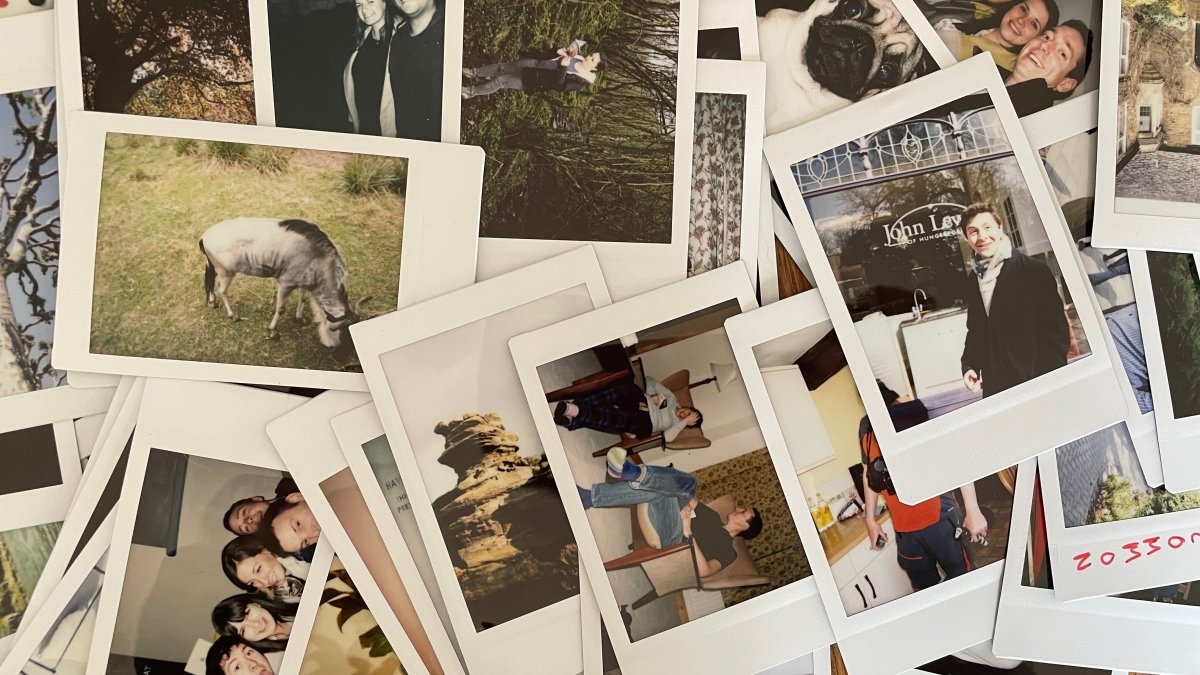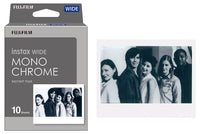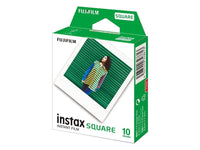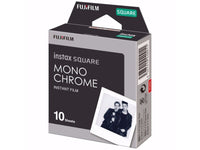Black Friday 2025 has landed at Analogue Wonderland, bringing some of our biggest film photography deals of the year - from discounted film and cameras to money-saving WonderLab processing offers, exclusive bundles, and festive specials available for a limited time only. Grab a great deal while stocks last!
Recent posts
Shop the article

Everything You Need to Know About Fujifilm Instax Films
By Emma Lloyd
In recent years, instant film cameras have seen a resurgence in popularity, and the Fujifilm Instax series is at the forefront of this trend. With their unique ability to capture and develop photos in real-time, Instax cameras offer a fun and nostalgic way to capture memories and moments. Whether you're looking to snap some casual shots with friends or create a stunning visual story, the Instax series has a camera and film option to fit your needs.
In this guide, we'll cover everything you need to know about selecting, using, and preserving your Instax prints, so you can start capturing amazing photos and sharing your memories in a tangible way.
If you are looking for a guide on Instax Film cameras check out our blog; The Ultimate Instax Camera Guide For Beginners
History of Instax Film
The history of Fujifilm Instax film can be traced back to the 1980s when instant film technology was at its peak of popularity. In response to this trend, Fujifilm developed their instant film technology, which would later become known as Instax. Initially, the film was only available in Japan, but its popularity grew, leading to worldwide distribution. In 1998, Fujifilm launched the Instax Mini format, which quickly became a popular choice for instant photography enthusiasts. Since then, the company has continued to innovate and expand the range of Instax cameras and film formats, including the popular Instax Square format. Today, Instax instant film cameras remain a popular choice for those who want to capture and share memories in a tangible and nostalgic way.
 Photo of the Instax 100, released in 1999, (c) Mahfoo on Flickr, who said they got it from a charity shop for 70p!
Photo of the Instax 100, released in 1999, (c) Mahfoo on Flickr, who said they got it from a charity shop for 70p!

Photo of Instax 500AF and film by (c) @lancephoto Lance Rothstein on Flickr
" My genuine Instax 500AF. The photos are so good that I often choose not to use it in preference of my expired Polaroids because the Instax pictures are actually TOO good. But don't bother asking - I'm not selling it. There are some occasions when it's just perfect."
Types of Instax Film
There are a range of Instax film cameras available to fit different types of photography styles, the three main formats are the mini, square and wide. They come in a range of designs, from colour, black and white and you can even get some funky limited edition designs to add colourful borders and patterns to your photos.
'Credit card sized joy, perfect for the everyday.'
It is about the size of a credit card and fits perfectly in your pocket or wallet. The most popular or classic fuji film option is the Instax Mini, perfect for everyday shooting and capturing fun moments.

Instax mini size illustration, with a loyalty card for size comparison. (c) Paul McKay
| Format | Instax Mini |
| Variety | available in colour, monochrome and other limited special editions |
| Type | Instant |
| ISO | 800 |
| Exposures | 10 |
| Frame Size | 46 x 62 mm |
| Overall Size | 54 x 86 mm |
Instax Square
'Neatly-framed SQUARE film, the go to for creators.'
Instax have also introduced the Instax Square format, which is more inline with the ‘traditional’ square instant format, like classic Polaroid films. It measures 86mm x 72mm and is perfect for portraits, landscapes, and still life photography.

Instax square size illustration. (c) Fujifilm
| Format | Instax Square |
| Variety | Available in colour and monochrome |
| Type | Instant |
| ISO | 800 |
| Exposures | 10 |
| Frame Size | 62 x 62 mm |
| Overall Size | 72 x 86 mm |
Instax Wide
'Twice as wide as the instax mini film, now there is room for everyone.'
The final Fuji Instant film available is Instax Wide Film. It measures 108 x 86mm, making it ideal for taking photos with families and large groups, or for landscape photography where you want to capture more detail. It's also ideal for wedding photographers for that reason!

Instax wide size illustration. (c) Fujifilm
| Format | Instax Wide |
| Colour | Available in colour and monochrome |
| Type | Instant |
| ISO | 800 |
| Exposures | 10 |
| Frame Size | 92 x 62 mm |
| Overall Size | 108 x 86 mm |
Enhance your Instax Photos with Filters
If you are looking to customise your instax shots further, you can try the BKIFI filters. These slot into the instax cartridge and super-impose patterns and effects onto your photos, such as hearts and flowers. Check out our blog with BKIFI here.

Instax mini shot with BKIFI instax mini adapters- hearts set
Applying and Loading the Instax Film
Before you can start shooting with your Instax camera, you will need to load the film correctly. To apply the film, remove it from its packaging and follow the instructions in your camera’s manual to slide it into the designated slot.
The important things to remember are:
- To avoid direct sunlight when loading the film
- Make sure your camera has fresh batteries loaded already
- Line up the yellow indicators on the film pack with the yellow marker on the camera, to make sure your film is inserted properly.
- Don't open your camera up until you have completed the 10 shots

Instructions from Fujifilm on loading an Instax mini camera, more details can be found on their website or in the instructional booklet included with your camera
When you first load your film a shot will be fired automatically, don't be surprised by this! The first shot taken will be the camera ejecting the dark slide, this is essentially a sheet of black plastic that prevents your film from being exposed whilst you load it. Once the dark slide has been ejected, you can start taking your shots as normal.


Photo showing where to line up yellow indicators on pack of instax film, nb this is an empty film pack
Taking Photos with Your Instax Film Camera
Now that your Instax film is loaded, you are now ready to take photos. Make sure you take your time with each shot and check the focus before committing to the shot.
Some Instax cameras will have different settings and modes, so be sure to check what yours is set to before you take your photo.
If you’re taking a group photo, try to get everyone as close together as possible so that everybody can fit in the frame. Once you’re happy with the photo, press down the shutter button. The camera will automatically eject the film, which will develop in just a few minutes. For best results, place your photo into a pocket or a holder that is out of direct sunlight while it develops.

A group photo taken on the #sheheartsfilm Nottinghill Photowalk
How to Preserve and Store Your Photo Prints
Once you've taken your photos make sure to store them in a safe place. Instax film prints can degrade over time so make sure it is stored in an album or scrapbook and away from direct sunlight, dust, heat and moisture. You can also use archival sleeves for extra protection and longevity of your prints. If you want to display your prints, consider using a frame with UV-protective glass to prevent fading. By taking care of your Instax prints, you can enjoy them for years to come.
Regularly checking on the condition of your photos will help ensure they last a lifetime!

A selection of instax mini photos (c) Paul McKay
Conclusion: Everything You Need to Know About Fujifilm Instax Films
In conclusion, Instax instant film cameras provide a fun and unique way to capture memories and moments in real-time. With a range of film formats available, including Instax Mini, Instax Square, and Instax Wide, there's an option to fit every photography style. Applying and loading the film is a straightforward process, and taking photos is a breeze. By following the tips and techniques outlined in this guide, you'll be able to capture amazing photos with your Instax camera and preserve them for years to come. Whether you're a beginner or an experienced photographer, Instax instant film cameras offer a fun and exciting way to capture and share your memories.
Ready to dive in?
Keep Reading
View all
Christmas 2025: Shipping & Opening Hours
Christmas 2025 is fast approaching! To make sure your analogue goodies arrive in time, take note of our last shipping dates, plus opening and operating hours over the festive season. We've got everything you need to gift the magic of film photography this Christmas!

Film Photography Christmas Gift Guide 2025: Analogue Wonderland
Capture the magic of Christmas with film - no filters needed. Our 2025 Film Photography Christmas Gift Guide 2025 is packed with thoughtful presents for every type of shooter, from curious beginners to seasoned photographers. Discover film stocks, cameras, and creative accessories that will make this festive season truly memorable.
Subscribe to our newsletter 💌
Sign up for our newsletter to stay up to date on film photography news, sales and events:
Free Tracked Shipping
On all UK orders over £50
Passion For Film
An unbeatable range and an on-site lab
Our Customers Trust Us
Thousands of independent 5* reviews
All Deliveries are Carbon Neutral
Independently audited and verified by Planet
- Opens in a new window.








1 Comment -
Pete •
This article should be called an introduction to Instax film, it is not everything you need to know, it doesn’t mention ISO, dynamic range, colour vs B&W. It does not mention their are Fuji cameras and third party cameras. I suggest you change the title and add another article :)